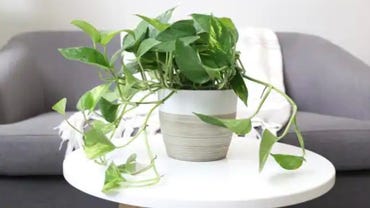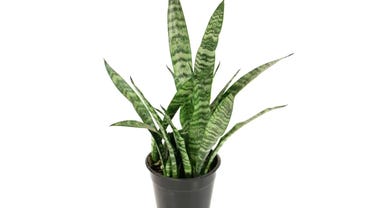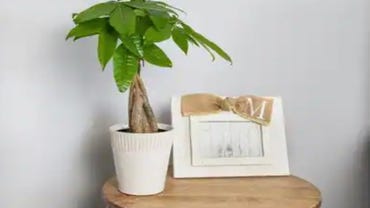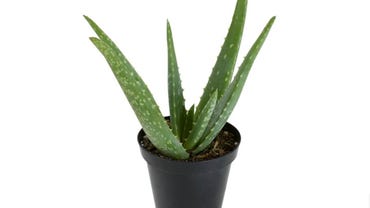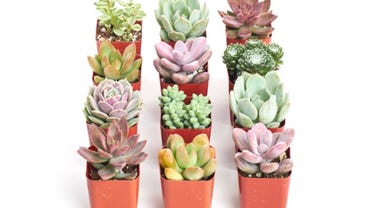Your office space should be a sanctuary of sorts. It should be comfortable, organized, and have things on your desk that bring you joy. Whether you work from home or work in an office, one thing you should have on your desk is a plant.
Research shows that having plants around the home and office significantly improves people’s moods and reduces the likelihood of stress-related depression. And, you don’t even have to have a green thumb to keep a plant on your desk—many indoor plants are low-maintenance.
We’ve rounded up the best indoor plants for your office, and we’ve got you covered whether you need one that’s easy to water, non-toxic to pets, or merely pretty to look at during lulls in the workday.
Pothos plant
Best for purifying air
Home Depot
Botanically known as Epipremnum aureum, a pothos plant is a great, low-maintenance indoor plant option. It grows best in medium-high light spots but can also adapt to low light if your office space isn’t very sunny.
Some benefits of a pothos plant are that it functions as an air purifier of sorts. It can also increase the humidity levels in your home, so having one on hand during the dry winter months could benefit your workspace.
Be sure to watch out for yellowing leaves, which means the plant’s environmental conditions are not ideal. Pothos plants prefer moist soil, but not wet or saturated soil, so water it when you notice it’s dry.
Pros
- Already pre-potted
- Can tolerate missed watering
- Different leaf varieties
Cons
- Leaves can burn in direct sunlight
- Prone to root rot
- Mildly toxic to pets
Snake plant
Best for any light conditions
Home Depot
Another air purifying plant to add to your desk is a snake plant, also known as Sansevieria trifasciata, or by Mother-in-Law’s Tongue. The snake plant requires little maintenance since it is drought tolerant. In addition, it thrives in a wide range of light conditions, so a snake plant will most likely grow whether your office is sunny or dark.
Just be sure to keep this indoor plant in the temperature range of 55-80 degrees Fahrenheit so it can properly grow. And, since the snake plant is a desert plant, only water it when the soil is 100% dry.
A bonus to the snake plant is that they perform a different type of photosynthesis at night and release more oxygen, so if your office space is located in your bedroom, you’ll benefit from it while you’re sleeping.
Pros
- Can withstand full sun and low light
- Limited watering and no need to mist
Cons
- Not pre-potted
- Grows at a slower rate when indoors
- Toxic to small children and pets
Money tree
Best for easy watering
Home Depot
The money tree (or Pachira aquatica) is known as a plant that brings good look in many cultures. In Feng Shui practices, money trees can bring money and good fortune to people, so what better plant to have on your work desk?
Money trees are extremely easy to water, making them the perfect indoor plant for those who don’t necessarily have a green thumb. Once a week, just put two ice cubes on the soil (or three tablespoons of water if you don’t have ice cubes on hand), and the plant should thrive. In addition, money trees also like bright, indirect light. However, they can also adapt to low and fluorescent lights, so even your office without windows should be able to be a decent environment for a money tree.
Pros
- Already pre-potted
- Non-toxic to pets
- Doubles as a good luck charm
Cons
- Be careful of overwatering
- Require regular pruning
Aloe vera
Best medicinal plant
Walmart
Maybe you want a plant that can act as more than just something nice to look at. In that case, the aloe vera plant (Aloe barbadensis miller) has medicinal properties in its aloe gel and can be used to soothe minor cuts, scrapes, and sunburns. You can apply the fresh aloe gel to your skin or add it to smoothies and drinks to reap its medicinal benefits. However, stay away from the aloe vera latex, a yellow substance found inside the leave that poses risks when ingested.
Aloe vera is technically a succulent, so it is drought-tolerant and needs bright light—about six hours of sunlight. For this reason, it’s best to place your aloe vera plant in a south or west-facing window. Also, keep your aloe vera in a pot that drains well since it cannot tolerate standing water and will die if there is no outlet for water drainage.
Pros
- Does not need to be fertilized
- Gel can be used internally or externally
- Easy maintenance
Cons
- Cannot tolerate standing water
- Pay attention to dosage information when taking aloe vera and talk to your doctor before taking or using aloe vera
- Toxic to pets
Succulents
Best low maintenance
Walmart
Succulents are stylish indoor plants that are also relatively easy to take care of. The only things your succulent needs are indirect sunlight (so be sure to place your plant by a window), a good watering once a week, and a pot with solid drainage.
Your succulent will need even less attention in the winter months since they become dormant. This means you can wait up to a month in between watering in the winter months, but always keep an eye on the leaves to see when they might need water.
While terrariums are a popular and stylish way to house succulents, it’s harder to keep them alive in one compared to growing them in a traditional pot. Since there are no drainage holes, if you plan to keep your succulent in a terrarium, it’s best to water it with a spray bottle or let an ice cube melt in it.
Pros
- Drought resistant
- Easy to propagate
- Comes in many different styles and colors
Cons
- Grows slow
- Not ideal for colder climates (if you have a cold office space)
- Can rot easily
Also: Best indoor garden
How did we choose these indoor plants?
We chose these plants based on our own experience growing them and how easy they are to care for. Of course, indoor plants shouldn’t be a job to take care of — you have your day job for that — so we made sure to choose relatively low-maintenance plants that thrive in a wider variety of conditions since office spaces can vary.
Which indoor plant is right for you?
To determine the right indoor plant for you, you’ll have to look at your office space. For example, if your desk is next to a window, you can opt for plants that like more sunlight. However, if you work in a room without windows or where there isn’t much natural light, it’s best to choose a plant that can thrive in low-light conditions.
Also, pay attention to the maintenance requirements for each plant. While all the plants on this list are relatively low maintenance, you still have to pay attention and look for clues for some to see how their health is doing. If you run into any problems with your plant, try watering less, changing the plant’s location, or looking into seeing if it might need fertilizer.
|
Plant |
Toxic? |
Sunlight |
Water |
|
Pothos |
Yes |
Medium-high light spots, but can adapt to low light |
Prefers moist soil, water when dry |
|
Snake plant |
Yes |
Any light conditions |
Water when soil is 100% dry |
|
Money tree |
No |
Bright indirect light, but can adapt to low and fluorescent light |
Two ice cubes on top of the soil once a week |
|
Aloe vera |
Yes |
Bright light |
Water when dry, make sure there are drainage holes |
|
Succulent |
Most are not, but some are |
Indirect sunlight |
Water once a week |
Where can you buy plants for your desk?
Stores like Home Depot, Lowe’s, and Walmart have gardening sections where you can buy plants. Your local nursery will also have plenty of options for indoor plants—just be sure you buy an indoor plant and not an outdoor plant, as they require different sunlight and watering expectations.
Are there alternative indoor plants worth considering?
Here are a few others to look into:
[ad_2]
Originally Appeared Here
